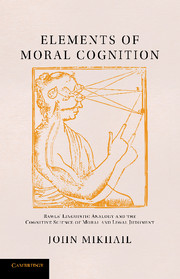 Elements of Moral Cognition
Elements of Moral Cognition Book contents
- Frontmatter
- Contents
- List of Tables and Figures
- Preface
- PART ONE THEORY
- 1 The Question Presented
- 2 A New Framework for the Theory of Moral Cognition
- 3 The Basic Elements of Rawls' Linguistic Analogy
- PART TWO EMPIRICAL ADEQUACY
- PART THREE OBJECTIONS AND REPLIES
- PART FOUR CONCLUSION
- Appendix: Six Trolley Problem Experiments
- Bibliography
- Index
1 - The Question Presented
Published online by Cambridge University Press: 07 September 2011
- Frontmatter
- Contents
- List of Tables and Figures
- Preface
- PART ONE THEORY
- 1 The Question Presented
- 2 A New Framework for the Theory of Moral Cognition
- 3 The Basic Elements of Rawls' Linguistic Analogy
- PART TWO EMPIRICAL ADEQUACY
- PART THREE OBJECTIONS AND REPLIES
- PART FOUR CONCLUSION
- Appendix: Six Trolley Problem Experiments
- Bibliography
- Index
Summary
The peasant, or the child, can reason, and judge, and speak his language, with a discernment, a consistency, and a regard to analogy, which perplex the logician, the moralist, and the grammarian, when they would find the principle upon which the proceeding is founded, or when they would bring to general rules, what is so familiar, and so well sustained in particular cases.
– Adam Ferguson, An Essay on the History of Civil SocietyIs the theory of moral cognition usefully modeled on aspects of Universal Grammar? Noam Chomsky has suggested on a number of occasions that it might be (see, e.g., 1978, 1986a, 1988a, 1993a). In A Theory of Justice, John Rawls makes a similar suggestion and compares his own elaborate characterization of the sense of justice with the linguist's account of linguistic competence (1971: 46–53). A number of other philosophers, including Stephen Stich (1993), Alvin Goldman (1993), Susan Dwyer (1999), Matthias Mahlmann (1999), and Gilbert Harman (2000), among others, have ruminated publicly about the idea as well. Despite this, and despite the fact that the competence–performance distinction and other parts of Chomsky's basic theoretical framework have been successfully utilized in other areas of cognitive science, such as vision and musical cognition, little sustained attention has been given to examining what a research program in moral cognition modeled on central features of Universal Grammar might look like, or how traditional philosophical questions about the nature of morality might be fruitfully addressed in these terms.
- Type
- Chapter
- Information
- Elements of Moral CognitionRawls' Linguistic Analogy and the Cognitive Science of Moral and Legal Judgment, pp. 3 - 12Publisher: Cambridge University PressPrint publication year: 2011


